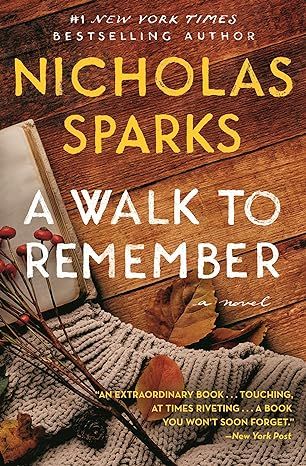A Walk to Remember
4.6
-
11,841 ratings
A high school rebel and a minister's daughter find strength in each other in this star-crossed tale of "young but everlasting love" (Chicago Sun-Times).
There was a time when the world was sweeter....when the women in Beaufort, North Carolina, wore dresses, and the men donned hats.... Every April, when the wind smells of both the sea and lilacs, Landon Carter remembers 1958, his last year at Beaufort High. Landon had dated a girl or two, and even once sworn that he'd been in love. Certainly the last person he thought he'd fall for was Jamie, the shy, almost ethereal daughter of the town's Baptist minister....Jamie, who was destined to show him the depths of the human heart-and the joy and pain of living. The inspiration for this novel came from Nicholas Sparks's sister: her life and her courage. From the internationally bestselling author Nicholas Sparks, comes his most moving story yet....
Kindle
$8.99
Available instantly
Audiobook
$0.99
with membership trial
Library Binding
$28.20
Paperback
$10.93
Ships from
Amazon.com
Payment
Secure transaction
ISBN-10
1538764695
ISBN-13
978-1538764695
Print length
224 pages
Language
English
Publisher
Grand Central Publishing
Publication date
June 24, 2019
Dimensions
5.25 x 0.85 x 8 inches
Item weight
2.31 pounds
Popular Highlights in this book
It was, I remembered thinking, the most difficult walk anyone ever had to make. In every way, a walk to remember.
Highlighted by 744 Kindle readers
I am not commanding you, but I want to test the sincerity of your love by comparing it to the earnestness of others
Highlighted by 709 Kindle readers
Life, I’ve learned, is never fair. If people teach anything in school, that should be it.
Highlighted by 405 Kindle readers
Product details
ASIN :
B000SEI230
File size :
6373 KB
Text-to-speech :
Enabled
Screen reader :
Supported
Enhanced typesetting :
Enabled
X-Ray :
Enabled
Word wise :
Enabled
Editorial reviews
Amazon.com Review
In the prologue to his latest novel, Nicholas Sparks makes the rather presumptuous pledge "first you will smile, and then you will cry," but sure enough, he delivers the goods. With his calculated ability to throw your heart around like a yo-yo (try out his earlier Message in the Bottle or The Notebook if you really want to stick it to yourself), Sparks pulls us back to the perfect innocence of a first love. In 1958 Landon Carter is a shallow but well-meaning teenager who spends most of his time hanging out with his friends and trying hard to ignore the impending responsibilities of adulthood. Then Landon gets roped into acting the lead in the Christmas play opposite the most renowned goody two-shoes in town: Jamie Sullivan. Against his best intentions and the taunts of his buddies, Landon finds himself falling for Jamie and learning some central lessons in life.
Like John Irving's A Prayer for Owen Meany, Sparks maintains a delicate and rarely seen balance of humor and sentiment. While the plot may not be the most original, this boy-makes-good tearjerker will certainly reel in the fans. Look for a movie starring beautiful people or, better yet, snuggle under the covers with your tissues nearby and let your inner sap run wild. --Nancy R.E. O'Brien
From Publishers Weekly
Sure to wring yet more tears from willing readers' eyes, the latest novel by the bestselling Sparks is a forced coming-of-age story concerning a pair of unlikely young lovers. In a corny flashback device that mimics The Notebook, 57-year-old Landon Carter spirits himself back to his fateful senior year in high school in Beaufort, N.C., when he was an archetypal troublemaking teenager of the 1950s, changed forever by an unexpected first love. Jamie Sullivan, the Bible-toting minister's daughter, with her drab brown sweaters, spinster hairstyle and sincere, beatific advice, is the obvious target of high school ridicule. Despite conspiring in Jamie's derision, class president Landon, desperate for a date for the homecoming dance, finds himself asking Jamie. Afterwards, Jamie asks him to participate with her in the metaphor-laden school Christmas play (Jamie plays the angel). Landon endures the taunting of his friends and forms an uneasy friendship with Jamie, which is carefully supervised by her father. The teens visit needy orphans, give Oscar-worthy performances in the school play and share dreams watching the sunset. Landon realizes he's in love with Jamie, but, of course, she is hiding a devastating secret that could wring her from Landon's arms forever. Now tortured by his knowledge of what will be her terrible fate, he must make the ultimate decision that catapults him into adulthood. Readers may be frustrated with the invariable formula that Sparks seems to regurgitate with regularity. Although the narrator declares, "My story can't be summed up in two or three sentences; it can't be packaged into something neat and simple that people would immediately understand," this is the author's most simple, formulaic, and blatantly melodramatic package to date. Agent, Theresa Park, Sanford Greenburger Associates. Doubleday Book Club and Literary Guild main selections; 20-city author tour; movie rights optioned by Denise DiNovi at Warner Bros.. (Oct.)
Copyright 1999 Reed Business Information, Inc.
From Library Journal
In Sparks's latest sentimental tale, a 17-year-old boy in 1950s North Carolina finds all his expectations overthrown by the Baptist minister's daughter. Film rights were purchased by the producer of Message in a Bottle. Copyright 1999 Reed Business Information, Inc.
From Booklist
In this nostalgic look back at the late 1950s, Sparks, author of Message in a Bottle , proves once again that he is a master at pulling heartstrings and bringing a tear to his readers' eyes. Beaufort, South Carolina, is a typical small town, and Landon Carter is just a regular guy poised to enjoy his senior year of high school until his father, the congressman, insists that because of his poor grades he needs to do something extra to get into college. Reluctantly, Landon runs for class president and wins. With his election comes responsibility, which includes attending the school dance. This puts Landon in a panic because he doesn't have a girlfriend. He decides to ask Jamie Sullivan, the minister's daughter, because she is the most acceptable of the geeks and probably hasn't been asked yet. They have a good time but Landon doesn't think much about her until they both star in the Christmas play, which her father wrote about his search for love after her mother died. Everyone is excited about Jamie starring as the angel, and Landon takes to walking her home after rehearsals. He finds himself falling in love, but Jamie has a secret that will break his--and Sparks' readers'--hearts. Told in Landon's down-home voice, this bittersweet tale will enthrall Sparks' numerous fans and should be a big hit during the holiday season. Patty Engelmann
From Kirkus Reviews
Sparks (The Notebook, 1996; Message in a Bottle, 1998) carries on in his determined effort to make people cry, this time with an old premise, slow windup, and wobbly pitch. In 1958, high-school senior Landon Carter is 17. Even though his father is a US Congressman, Landons best friends are on the taunting, swaggering sidefootball players and such, who hang around at the local drive-in and flaunt their disrespect. So its strange indeed when Landon gets involved with the nicest girl in townclassmate Jamie Sullivan, who carries a Bible everywhere she goes, does endless good deeds, and is the only child of the widowed Rev. Hegbert Sullivan, the churchman whom Landon and gang love to throw taunts after from hiding places behind trees. But Landon has enrolled in a drama class (for the easy A), and that class is responsible for putting on the annual Christmas play, written by Hegbert, which will be special this year because the authors beloved daughter will have the female leadshes an angel who ministers to a sorrow-filled widower. When Jamie asks Landon if he wont please be the male lead, what can he say? And what can he do, as rehearsals go on, when he starts not only respecting Jamie, but liking her? Embarrassing as it is before his friends, Landon starts helping her do good deeds, and, on performance night, seeing her true beauty for the first time, falls in love with her. Oh, say it isnt sosince great, deep sorrow lies ahead. For Jamie has a secret that, when she tells it to her loving Landon, explains everythingthe Bible she carries, new meanings in the Christmas play, even Jamies reasons for finding it really special this year. Sparks pulls out all the stops as Landon, from a vantage of 40 years later, tells the story out to its teary end. Weepy wisdom aimed at the holiday trade. -- Copyright ©1999, Kirkus Associates, LP. All rights reserved.
Review
This bittersweet tale will enthrall Sparks' numerous fans. -- "Booklist"
An extraordinary book...touching, at times riveting...A book you won't soon forget. -- "New York Post"
From the Back Cover
There was a time when the world was sweeter . . . when the women in Beaufort, North Carolina, wore dresses, and the men donned hats. . . when something happened to a seventeen year-old boy that would change his life forever. Every April, when the wind blows in from the sea and mingles with the scent of lilacs, Landon Carter remembers his last year at Beaufort High.
It was 1958, and Landon had already dated a girl or two. He even swore that he had once been in love. Certainly the last person in town he thought he'd fall for was Jamie Sullivan, the daughter of the town's Baptist minister.
A quiet girl who always carried a Bible with her schoolbooks, Jamie seemed content living in a world apart from the other teens. She took care of her widowed father, rescued hurt animals, and helped out at the local orphanage. No boy had ever asked her out.
Landon would never have dreamed of it. Then a twist of fate made Jamie his partner for the homecoming dance, and Landon Carter's life would never be the same. Being with Jamie would show him the depths of the human heart and lead him to a decision so stunning it would send him irrevocably on the road to manhood . . .
No other author today touches our emotions more deeply than Nicholas Sparks. Illuminating both the strength and the gossamer fragility of our deepest emotions, his two New York Times bestsellers, The Notebook and Message in a Bottle, have established him as the leading author of today's most cherished love stories. Now, in A WALK TO REMEMBER, he tells a truly unforgettable story, one that glimmers with all of his magic, holding us spell-bound -- and reminding us that in life each of us may find one great love, the kind thatchanges everything . . .
About the Author
With over ninety-five million copies of his books sold, Nicholas Sparks is one of the world's most beloved storytellers. His novels include twelve #1 New York Times bestsellers, and all his books, including Three Weeks with My Brother, the memoir he wrote with his brother, Micah, have been New York Times and international bestsellers, and were translated into more than fifty languages. Nine of Nicholas Sparks's novels-The Best of Me, Safe Haven, The Lucky One, The Last Song, Dear John, Nights in Rodanthe, The Notebook, A Walk to Remember, and Message in a Bottle-were also adapted into major motion pictures. In 2011, he founded the Nicholas Sparks Foundation to inspire and transform students' lives though education, curriculum development, and life-changing international experiences. To learn more, go to www.NicholasSparksFoundation.org. The author lives in North Carolina with his wife and family. You can visit him at www.NicholasSparks.com.
Frank Muller (1951-2008) was an Audie Award-winning narrator. A classically trained actor, Frank appeared on both television and the stage. His credits include Hamlet, The Crucible, The Taming of the Shrew, The Importance of Being Earnest, Law & Order, All My Children, and many, many more. In 1999 Frank was awarded the AudioFile Lifetime Achievement Award, the top honor in the audiobook community. He has also won twenty-three Earphones Awards.
Read more
Sample
Excerpt. © Reprinted by permission. All rights reserved.
A Walk to Remember By Nicholas Sparks
Chapter One
In 1958, Beaufort, North Carolina, which is located on the coast near Morehead City,was a place like many other small southern towns. It was the kind of place where thehumidity rose so high in the summer that walking out to get the mail made a personfeel as if he needed a shower, and kids walked around barefoot from April throughOctober beneath oak trees draped in Spanish moss. People waved from their carswhenever they saw someone on the street whether they knew him or not, and the airsmelled of pine, salt, and sea, a scent unique to the Carolinas. For many of thepeople there, fishing in the Pamlico Sound or crabbing in the Neuse River was a wayof life, and boats were moored wherever you saw the Intracoastal Waterway. Only threechannels came in on the television, though television was never important to those ofus who grew up there. Instead our lives were centered around the churches, of whichthere were eighteen within the town limits alone. They went by names like theFellowship Hall Christian Church, the Church of the Forgiven People, the Church ofSunday Atonement, and then, of course, there were the Baptist churches. When I wasgrowing up, it was far and away the most popular denomination around, and there wereBaptist churches on practically every corner of town, though each considered itselfsuperior to the others. There were Baptist churches of every type?Freewill Baptists,Southern Baptists, Congregational Baptists, Missionary Baptists, Independent Baptists. . . well, you get the picture.
Back then, the big event of the year was sponsored by the Baptist churchdowntown?Southern, if you really want to know?in conjunction with the local highschool. Every year they put on their Christmas pageant at the Beaufort Playhouse,which was actually a play that had been written by Hegbert Sullivan, a minister who'dbeen with the church since Moses parted the Red Sea. Okay, maybe he wasn't that old,but he was old enough that you could almost see through the guy's skin. It was sortof clammy all the time, and translucent?kids would swear they actually saw the bloodflowing through his veins?and his hair was as white as those bunnies you see in petstores around Easter.
Anyway, he wrote this play called The Christmas Angel, because he didn't wantto keep on performing that old Charles Dickens classic A Christmas Carol. Inhis mind Scrooge was a heathen, who came to his redemption only because he sawghosts, not angels?and who was to say whether they'd been sent by God, anyway? Andwho was to say he wouldn't revert to his sinful ways if they hadn't been sentdirectly from heaven? The play didn't exactly tell you in the end?it sort of playsinto faith and all?but Hegbert didn't trust ghosts if they weren't actually sent byGod, which wasn't explained in plain language, and this was his big problem with it.A few years back he'd changed the end of the play?sort of followed it up with his ownversion, complete with old man Scrooge becoming a preacher and all, heading off toJerusalem to find the place where Jesus once taught the scribes. It didn't fly toowell?not even to the congregation, who sat in the audience staring wide-eyed at thespectacle?and the newspaper said things like "Though it was certainly interesting, itwasn't exactly the play we've all come to know and love. . . ."
So Hegbert decided to try his hand at writing his own play. He'd written his ownsermons his whole life, and some of them, we had to admit, were actually interesting,especially when he talked about the "wrath of God coming down on the fornicators" andall that good stuff. That really got his blood boiling, I'll tell you, when he talkedabout the fornicators. That was his real hot spot. When we were younger, my friendsand I would hide behind the trees and shout, "Hegbert is a fornicator!" when we sawhim walking down the street, and we'd giggle like idiots, like we were the wittiestcreatures ever to inhabit the planet.
Old Hegbert, he'd stop dead in his tracks and his ears would perk up?I swear to God,they actually moved?and he'd turn this bright shade of red, like he'd just drunkgasoline, and the big green veins in his neck would start sticking out all over, likethose maps of the Amazon River that you see in National Geographic. He'd peer fromside to side, his eyes narrowing into slits as he searched for us, and then, just assuddenly, he'd start to go pale again, back to that fishy skin, right before oureyes. Boy, it was something to watch, that's for sure.
So we'd be hiding behind a tree and Hegbert (what kind of parents name their kidHegbert, anyway?) would stand there waiting for us to give ourselves up, as if hethought we'd be that stupid. We'd put our hands over our mouths to keep from laughingout loud, but somehow he'd always zero in on us. He'd be turning from side to side,and then he'd stop, those beady eyes coming right at us, right through the tree. "Iknow who you are, Landon Carter," he'd say, "and the Lord knows, too." He'd let thatsink in for a minute or so, and then he'd finally head off again, and during thesermon that weekend he'd stare right at us and say something like "God is merciful tochildren, but the children must be worthy as well." And we'd sort of lower ourselvesin the seats, not from embarrassment, but to hide a new round of giggles. Hegbertdidn't understand us at all, which was really sort of strange, being that he had akid and all. But then again, she was a girl. More on that, though, later.
Anyway, like I said, Hegbert wrote The Christmas Angel one year and decided to put onthat play instead. The play itself wasn't bad, actually, which surprised everyone thefirst year it was performed. It's basically the story of a man who had lost his wifea few years back. This guy, Tom Thornton, used to be real religious, but he had acrisis of faith after his wife died during childbirth. He's raising this little girlall on his own, but he hasn't been the greatest father, and what the little girlreally wants for Christmas is a special music box with an angel engraved on top, apicture of which she'd cut out from an old catalog. The guy searches long and hard tofind the gift, but he can't find it anywhere. So it's Christmas Eve and he's stillsearching, and while he's out looking through the stores, he comes across a strangewoman he's never seen before, and she promises to help him find the gift for hisdaughter. First, though, they help this homeless person (back then they were calledbums, by the way), then they stop at an orphanage to see some kids, then visit alonely old woman who just wanted some company on Christmas Eve. At this point themysterious woman asks Tom Thornton what he wants for Christmas, and he says that hewants his wife back. She brings him to the city fountain and tells him to look in thewater and he'll find what he's looking for. When he looks in the water, he sees theface of his little girl, and he breaks down and cries right there. While he'ssobbing, the mysterious lady runs off, and Tom Thornton searches but can't find heranywhere. Eventually he heads home, the lessons from the evening playing in his mind.He walks into his little girl's room, and her sleeping figure makes him realize thatshe's all he has left of his wife, and he starts to cry again because he knows hehasn't been a good enough father to her. The next morning, magically, the music boxis underneath the tree, and the angel that's engraved on it looks exactly like thewoman he'd seen the night before.
So it wasn't that bad, really. If truth be told, people cried buckets whenever theysaw it. The play sold out every year it was performed, and due to its popularity,Hegbert eventually had to move it from the church to the Beaufort Playhouse, whichhad a lot more seating. By the time I was a senior in high school, the performancesran twice to packed houses, which, considering who actually performed it, was a storyin and of itself.
You see, Hegbert wanted young people to perform the play?seniors in high school, notthe theater group. I reckon he thought it would be a good learning experience beforethe seniors headed off to college and came face-to-face with all the fornicators. Hewas that kind of guy, you know, always wanting to save us from temptation. He wantedus to know that God is out there watching you, even when you're away from home, andthat if you put your trust in God, you'll be all right in the end. It was a lessonthat I would eventually learn in time, though it wasn't Hegbert who taught me.
As I said before, Beaufort was fairly typical as far as southern towns went, thoughit did have an interesting history. Blackbeard the pirate once owned a house there,and his ship, Queen Anne's Revenge, is supposedly buried somewhere in thesand just offshore. Recently some archaeologists or oceanographers or whoever looksfor stuff like that said they found it, but no one's certain just yet, being that itsank over 250 years ago and you can't exactly reach into the glove compartment andcheck the registration. Beaufort's come a long way since the 1950s, but it's stillnot exactly a major metropolis or anything. Beaufort was, and always will be, on thesmallish side, but when I was growing up, it barely warranted a place on the map. Toput it into perspective, the congressional district that included Beaufort coveredthe entire eastern part of the state?some twenty thousand square miles?and therewasn't a single town with more than twenty-five thousand people. Even compared withthose towns, Beaufort was regarded as being on the small side. Everything east ofRaleigh and north of Wilmington, all the way to the Virginia border, was the districtmy father represented.
I suppose you've heard of him. He's sort of a legend, even now. His name is WorthCarter, and he was a congressman for almost thirty years. His slogan every other yearduring the election season was "Worth Carter represents??," and the person wassupposed to fill in the city name where he or she lived. I can remember, driving ontrips when me and Mom had to make our appearances to show the people he was a truefamily man, that we'd see those bumper stickers, stenciled in with names like Otwayand Chocawinity and Seven Springs. Nowadays stuff like that wouldn't fly, but backthen that was fairly sophisticated publicity. I imagine if he tried to do that now,people opposing him would insert all sorts of foul language in the blank space, butwe never saw it once. Okay, maybe once. A farmer from Duplin County once wrote theword shit in the blank space, and when my mom saw it, she covered my eyes andsaid a prayer asking for forgiveness for the poor ignorant bastard. She didn't sayexactly those words, but I got the gist of it.
So my father, Mr. Congressman, was a bigwig, and everyone but everyone knew it,including old man Hegbert. Now, the two of them didn't get along, not at all, despitethe fact that my father went to Hegbert's church whenever he was in town, which to befrank wasn't all that often. Hegbert, in addition to his belief that fornicators weredestined to clean the urinals in hell, also believed that communism was "a sicknessthat doomed mankind to heathenhood." Even though heathenhood wasn't a word?I can'tfind it in any dictionary?the congregation knew what he meant. They also knew that hewas directing his words specifically to my father, who would sit with his eyes closedand pretend not to listen. My father was on one of the House committees that oversawthe "Red influence" supposedly infiltrating every aspect of the country, includingnational defense, higher education, and even tobacco farming. You have to rememberthat this was during the cold war; tensions were running high, and we NorthCarolinians needed something to bring it down to a more personal level. My father hadconsistently looked for facts, which were irrelevant to people like Hegbert.
Afterward, when my father would come home after the service, he'd say something like"Reverend Sullivan was in rare form today. I hope you heard that part about theScripture where Jesus was talking about the poor. . . ."
Yeah, sure, Dad. . . .
My father tried to defuse situations whenever possible. I think that's why he stayedin Congress for so long. The guy could kiss the ugliest babies known to mankind andstill come up with something nice to say. "He's such a gentle child," he'd say when ababy had a giant head, or, "I'll bet she's the sweetest girl in the world," if shehad a birthmark over her entire face. One time a lady showed up with a kid in awheelchair. My father took one look at him and said, "I'll bet you ten to one thatyou're smartest kid in your class." And he was! Yeah, my father was great at stufflike that. He could fling it with the best of 'em, that's for sure. And he wasn'tsuch a bad guy, not really, especially if you consider the fact that he didn't beatme or anything.
But he wasn't there for me growing up. I hate to say that because nowadays peopleclaim that sort of stuff even if their parent was around and use it to excusetheir behavior. My dad . . . he didn't love me . . . that's why I became astripper and performed on The Jerry Springer Show. . . . I'm not using it toexcuse the person I've become, I'm simply saying it as a fact. My father was gonenine months of the year, living out of town in a Washington, D.C., apartment threehundred miles away. My mother didn't go with him because both of them wanted me togrow up "the same way they had."
Of course, my father's father took him hunting and fishing, taught him to play ball,showed up for birthday parties, all that small stuff that adds up to quite a bitbefore adulthood. My father, on the other hand, was a stranger, someone I barely knewat all. For the first five years of my life I thought all fathers lived somewhereelse. It wasn't until my best friend, Eric Hunter, asked me in kindergarten who thatguy was who showed up at my house the night before that I realized something wasn'tquite right about the situation.
"He's my father," I said proudly.
"Oh," Eric said as he rifled through my lunchbox, looking for my Milky Way, "I didn'tknow you had a father."
Talk about something whacking you straight in the face.
So, I grew up under the care of my mother. Now she was a nice lady, sweet and gentle,the kind of mother most people dream about. But she wasn't, nor could she ever be, amanly influence in my life, and that fact, coupled with my growing disillusionmentwith my father, made me become something of a rebel, even at a young age. Not a badone, mind you. Me and my friends might sneak out late and soap up car windows now andthen or eat boiled peanuts in the graveyard behind the church, but in the fiftiesthat was the kind of thing that made other parents shake their heads and whisper totheir children, "You don't want to be like that Carter boy. He's on the fast track toprison."
Me. A bad boy. For eating boiled peanuts in the graveyard. Go figure.
Anyway, my father and Hegbert didn't get along, but it wasn't only because ofpolitics. No, it seems that my father and Hegbert knew each other from way back when.Hegbert was about twenty years older than my father, and back before he was aminister, he used to work for my father's father. My grandfather?even though he spentlots of time with my father?was a true bastard if there ever was one. He was the one,by the way, who made the family fortune, but I don't want you to imagine him as thesort of man who slaved over his business, working diligently and watching it grow,prospering slowly over time. My grandfather was much shrewder than that. The way hemade his money was simple?he started as a bootlegger, accumulating wealth throughoutProhibition by running rum up from Cuba. Then he began buying land and hiringsharecroppers to work it. He took ninety percent of the money the sharecroppers madeon their tobacco crop, then loaned them money whenever they needed it at ridiculousinterest rates. Of course, he never intended to collect the money?instead he wouldforeclose on any land or equipment they happened to own. Then, in what he called "hismoment of inspiration," he started a bank called Carter Banking and Loan. The onlyother bank in a two-county radius had mysteriously burned down, and with the onset ofthe Depression, it never reopened. Though everyone knew what had really happened, nota word was ever spoken for fear of retribution, and their fear was well placed. Thebank wasn't the only building that had mysteriously burned down.
His interest rates were outrageous, and little by little he began amassing more landand property as people defaulted on their loans. When the Depression hit hardest, heforeclosed on dozens of businesses throughout the county while retaining the originalowners to continue to work on salary, paying them just enough to keep them where theywere, because they had nowhere else to go. He told them that when the economyimproved, he'd sell their business back to them, and people always believed him.
Never once, however, did he keep his promise. In the end he controlled a vast portionof the county's economy, and he abused his clout in every way imaginable.
I'd like to tell you he eventually went to a terrible death, but he didn't. He diedat a ripe-old age while sleeping with his mistress on his yacht off the CaymanIslands. He'd outlived both his wives and his only son. Some end for a guy like that,huh? Life, I've learned, is never fair. If people teach anything in school, thatshould be it.
But back to the story. . . . Hegbert, once he realized what a bastard my grandfatherreally was, quit working for him and went into the ministry, then came back toBeaufort and started ministering in the same church we attended. He spent his firstfew years perfecting his fire-and-brimstone act with monthly sermons on the evils ofthe greedy, and this left him scant time for anything else. He was forty-three beforehe ever got married; he was fifty-five when his daughter, Jamie Sullivan, was born.His wife, a wispy little thing twenty years younger than he, went through sixmiscarriages before Jamie was born, and in the end she died in childbirth, makingHegbert a widower who had to raise a daughter on his own. Hence, of course, the storybehind the play.
People knew the story even before the play was first performed. It was one of thosestories that made its rounds whenever Hegbert had to baptize a baby or attend afuneral. Everyone knew about it, and that's why, I think, so many people gotemotional whenever they saw the Christmas play. They knew it was based on somethingthat happened in real life, which gave it special meaning.
Jamie Sullivan was a senior in high school, just like me, and she'd already beenchosen to play the angel, not that anyone else even had a chance. This, of course,made the play extra special that year. It was going to be a big deal, maybe thebiggest ever?at least in Miss Garber's mind. She was the drama teacher, and she wasalready glowing about the possibilities the first time I met her in class.
Now, I hadn't really planned on taking drama that year. I really hadn't, but it waseither that or chemistry II. The thing was, I thought it would be a blow-off class,especially when compared with my other option. No papers, no tests, no tables whereI'd have to memorize protons and neutrons and combine elements in their properformulas . . . what could possibly be better for a high school senior? It seemed likea sure thing, and when I signed up for it, I thought I'd just be able to sleepthrough most every class, which, considering my late night peanut eating, was fairlyimportant at the time.
On the first day of class I was one of the last to arrive, coming in just a fewseconds before the bell rang, and I took a seat in the back of the room. Miss Garberhad her back turned to the class, and she was busy writing her name in big cursiveletters, as if we didn't know who she was. Everyone knew her?it was impossible notto. She was big, at least six feet two, with flaming red hair and pale skin thatshowed her freckles well into her forties. She was also overweight?I'd say honestlyshe pushed two fifty and she had a fondness for wearing flower-patterned muumuus. Shehad thick, dark, horn-rimmed glasses, and she greeted every one with, "Helloooooo,"sort of singing the last syllable. Miss Garber was one of a kind, that's for sure,and she was single, which made it even worse. A guy, no matter how old, couldn't helpbut feel sorry for a gal like her.
Beneath her name she wrote the goals she wanted to accomplish that year."Self-confidence" was number one, followed by "Self-awareness" and, third,"Self-fulfillment." Miss Garber was big into the "self" stuff, which put her reallyahead of the curve as far as psychotherapy is concerned, though she probably didn'trealize it at the time. Miss Garber was a pioneer in that field. Maybe it hadsomething to do with the way she looked; maybe she was just trying to feel betterabout herself.
But I digress.
It wasn't until the class started that I noticed something unusual. Though BeaufortHigh School wasn't large, I knew for a fact that it was pretty much split fifty-fiftybetween males and females, which was why I was surprised when I saw that this classwas at least ninety percent female. There was only one other male in the class, whichto my thinking was a good thing, and for a moment I felt flush with a "look outworld, here I come" kind of feeling. Girls, girls, girls . . . I couldn't help butthink. Girls and girls and no tests in sight.
Okay, so I wasn't the most forward-thinking guy on the block.
So Miss Garber brings up the Christmas play and tells everyone that Jamie Sullivan isgoing to be the angel that year. Miss Garber started clapping right away?she was amember of the church, too?and there were a lot of people who thought she was gunningfor Hegbert in a romantic sort of way. The first time I heard it, I remember thinkingthat it was a good thing they were too old to have children, if they ever did gettogether. Imagine?translucent with freckles? The very thought gave everyone shudders,but of course, no one ever said anything about it, at least within hearing distanceof Miss Garber and Hegbert. Gossip is one thing, hurtful gossip is completelyanother, and even in high school we weren't that mean.
Miss Garber kept on clapping, all alone for a while, until all of us finally joinedin, because it was obvious that was what she wanted. "Stand up, Jamie," she said. SoJamie stood up and turned around, and Miss Garber started clapping even faster, as ifshe were standing in the presence of a bona fide movie star.
Now Jamie Sullivan was a nice girl. She really was. Beaufort was small enough that ithad only one elementary school, so we'd been in the same classes our entire lives,and I'd be lying if I said I never talked to her. Once, in second grade, she'd sat inthe seat right next to me for the whole year, and we'd even had a few conversations,but it didn't mean that I spent a lot of time hanging out with her in my spare time,even back then. Who I saw in school was one thing; who I saw after school wassomething completely different, and Jamie had never been on my social calendar.
It's not that Jamie was unattractive?don't get me wrong. She wasn't hideous oranything like that. Fortunately she'd taken after her mother, who, based on thepictures I'd seen, wasn't half-bad, especially considering who she ended up marrying.But Jamie wasn't exactly what I considered attractive, either. Despite the fact thatshe was thin, with honey blond hair and soft blue eyes, most of the time she lookedsort of . . . plain, and that was when you noticed her at all. Jamie didn't care muchabout outward appearances, because she was always looking for things like "innerbeauty," and I suppose that's part of the reason she looked the way she did. For aslong as I'd known her?and this was going way back, remember?she'd always worn herhair in a tight bun, almost like a spinster, without a stitch of makeup on her face.Coupled with her usual brown cardigan and plaid skirt, she always looked as thoughshe were on her way to interview for a job at the library. We used to think it wasjust a phase and that she'd eventually grow out of it, but she never had. Eventhrough our first three years of high school, she hadn't changed at all. The onlything that had changed was the size of her clothes.
But it wasn't just the way Jamie looked that made her different; it was also the wayshe acted. Jamie didn't spend any time hanging out at Cecil's Diner or going toslumber parties with other girls, and I knew for a fact that she'd never had aboyfriend her entire life. Old Hegbert would probably have had a heart attack if shehad. But even if by some odd turn of events Hegbert had allowed it, it still wouldn'thave mattered. Jamie carried her Bible wherever she went, and if her looks andHegbert didn't keep the boys away, the Bible sure as heck did. Now, I liked the Bibleas much as the next teenage boy, but Jamie seemed to enjoy it in a way that wascompletely foreign to me. Not only did she go to vacation Bible school every August,but she would read the Bible during lunch break at school. In my mind that justwasn't normal, even if she was the minister's daughter. No matter how you sliced it,reading Paul's letters to the Ephesians wasn't nearly as much fun as flirting, if youknow what I mean.
But Jamie didn't stop there. Because of all her Bible reading, or maybe because ofHegbert's influence, Jamie believed it was important to help others, and helpingothers is exactly what she did. I knew she volunteered at the orphanage in MoreheadCity, but for her that simply wasn't enough. She was always in charge of onefund-raiser or another, helping everyone from the Boy Scouts to the IndianPrincesses, and I know that when she was fourteen, she spent part of her summerpainting the outside of an elderly neighbor's house. Jamie was the kind of girl whowould pull weeds in someone's garden without being asked or stop traffic to helplittle kids cross the road. She'd save her allowance to buy a new basketball for theorphans, or she'd turn around and drop the money into the church basket on Sunday.She was, in other words, the kind of girl who made the rest of us look bad, andwhenever she glanced my way, I couldn't help but feel guilty, even though I hadn'tdone anything wrong.
Nor did Jamie limit her good deeds to people. If she ever came across a woundedanimal, for instance, she'd try to help it, too. Opossums, squirrels, dogs, cats,frogs . . . it didn't matter to her. Dr. Rawlings, the vet, knew her by sight, andhe'd shake his head whenever he saw her walking up to the door carrying a cardboardbox with yet another critter inside. He'd take off his eyeglasses and wipe them withhis handkerchief while Jamie explained how she'd found the poor creature and what hadhappened to it. "He was hit by a car, Dr. Rawlings. I think it was in the Lord's planto have me find him and try to save him. You'll help me, won't you?"
With Jamie, everything was in the Lord's plan. That was another thing. She alwaysmentioned the Lord's plan whenever you talked to her, no matter what the subject. Thebaseball game's rained out? Must be the Lord's plan to prevent something worse fromhappening. A surprise trigonometry quiz that everyone in class fails? Must be in theLord's plan to give us challenges. Anyway, you get the picture.
Then, of course, there was the whole Hegbert situation, and this didn't help her atall. Being the minister's daughter couldn't have been easy, but she made it seem asif it were the most natural thing in the world and that she was lucky to have beenblessed in that way. That's how she used to say it, too. "I've been so blessed tohave a father like mine." Whenever she said it, all we could do was shake our headsand wonder what planet she actually came from.
Despite all these other strikes, though, the one thing that really drove mecrazy about her was the fact that she was always so damn cheerful, no matter what washappening around her. I swear, that girl never said a bad thing about anything oranyone, even to those of us who weren't that nice to her. She would hum to herself asshe walked down the street, she would wave to strangers driving by in their cars.Sometimes ladies would come running out of their house if they saw her walking by,offering her pumpkin bread if they'd been baking all day or lemonade if the sun washigh in the sky. It seemed as if every adult in town adored her. "She's such a niceyoung lady," they'd say whenever Jamie's name came up. "The world would be a betterplace if there were more people like her."
But my friends and I didn't quite see it that way. In our minds, one Jamie Sullivanwas plenty.
I was thinking about all this while Jamie stood in front of us on the first day ofdrama class, and I admit that I wasn't much interested in seeing her. But strangely,when Jamie turned to face us, I kind of got a shock, like I was sitting on a loosewire or something. She wore a plaid skirt with a white blouse under the same browncardigan sweater I'd seen a million times, but there were two new bumps on her chestthat the sweater couldn't hide that I swore hadn't been there just three monthsearlier. She'd never worn makeup and she still didn't, but she had a tan, probablyfrom Bible school, and for the first time she looked?well, almost pretty. Of course,I dismissed that thought right away, but as she looked around the room, she stoppedand smiled right at me, obviously glad to see that I was in the class. It wasn'tuntil later that I would learn the reason why.
Read more
About the authors
Nicholas Sparks
Nicholas Sparks is one of the world’s most beloved storytellers. All of his books have been New York Times bestsellers, with over 130 million copies sold worldwide, in more than 50 languages, including over 92 million copies in the United States alone.
Eleven of Nicholas Sparks's novels—The Choice, The Longest Ride, The Best of Me, Safe Haven, The Lucky One, The Last Song, Dear John, Nights in Rodanthe, The Notebook, A Walk to Remember, and Message in a Bottle—have been adapted into major motion pictures. The Notebook has also been adapted into a Broadway musical, featuring music and lyrics by Ingrid Michaelson.
Read more
Reviews
Customer reviews
4.6 out of 5
11,841 global ratings
Casilu Neal
5
Sparks first book.
Reviewed in the United States on August 23, 2024
Verified Purchase
I am slowly accumulating all of his books. Had this one before, but gave it away. Replacement.
Barb G.
5
Good Read
Reviewed in the United States on September 27, 2024
Verified Purchase
I love this story even though it has a sad ending. It's well written and entertaining.
Diana Lopez Colon
5
Excelente
Reviewed in the United States on September 10, 2024
Verified Purchase
Es excelente
Roberto Ramos
5
My Favorite
Reviewed in the United States on September 1, 2024
Verified Purchase
This is the best Nicholas Sparks book ever
Mark Oresic
5
Superb!
Reviewed in the United States on October 22, 2018
Verified Purchase
I just checked, and to date, there are 1989 reviews for Author Nicholas Spark’s novel “A Walk To Remember”, which of course begs the question: Do we really need yet another review? Perhaps not; and to be sure, such a vast number of reviews for just one of his novels among around 20 to his credit thus far, clearly speaks for itself, and shouts … ‘yes, he’s that good!’
Nevertheless; whatever meager words or thoughts I might add herein, might just be a help or a comfort or an illuminating inspiration to perhaps just one random reader; so here is my review:
This novel; A Walk To Remember; like a good number of books and movies, deals with love and loss, and more specifically, life and death. Each of us, regardless of who we are, will inevitably die one day, and before that happens, we will experience the death of others not only older than us, but also more than likely very dear to us.
While the experience of reading about such stark realities of life may not necessarily seem to be a pleasant experience, such a reading exercise does properly prepare us in the present, to more effectively deal with loss and death of a loved one in the future.
Now while an inspired sermon would clearly be the only adequate means to sufficiently treat such a serious and inevitable life event, this brief review is neither the time nor the place. But suffice it to say, that without a thorough foundational understanding of both ancient and modern day scripture (think ‘The Church of Jesus Christ of Latter-day Saints’), giving us ample knowledge and intelligence of a much higher plain on such a sobering topic, we can not properly grasp or deal with the topic of loss and death as part and parcel of the human experience.
For example: the four most important philosophical questions; 1) who are we, prior to being conceived into this mortal earth by our parents? 2) where did we come from (prior to the exact moment of our mortal physical conception), (or in what exact form was our pre-physical conception existence, according to Latter-day scripture)? 3) why are we here (in mortality)? and, 4) where are we going (when we depart this mortal realm)? - are tough questions that are all answered within scripture, particularly modern-day or Latter-day scripture.
As such; while the novel - A Walk To Remember - like all of Mr. Sparks’ books/movies, are absolutely fantastic; I couldn’t help but feel that the characters in the novel and indeed we ourselves the readers, could have benefited much more in delving into such a serious topic and dealing with actual death (others or our own, still pending), if we only spent the requisite time necessary to first read the scriptures (the ‘owners manual’ of life), to become better acquainted with the real purpose of both mortal life and mortal death.
The problem to be overcome in changing our mind and deciding to read the scriptures is to first get rid of a worldly attitude which scripture defines as: “Trampling underfoot the ‘Word of God’, and counting ‘it’ as a thing of nought.”
Such an attitude is gravely dangerous to both our mortal and post-mortal well being, for the old saying: ‘Ignorance is bliss’ is clearly not true; whereas the alternative saying ‘Knowledge is power’ is clearly more helpful in being properly prepared for the inevitable fate which awaits us all.
Notwithstanding these sobering thoughts; ‘A Walk To Remember’ was clearly, another shining example of Mr. Sparks’ finely tuned story telling talents. And I agree with what another reader has said about this novel in particular, that it will definitely make you laugh allot at first, but it will also bring you to tears as well.
But again; having a proper and thorough understanding of mortal life and death; is clearly the only adequate prerequisite to effectively and sufficiently grasp and deal with such serious and sobering topics; not just to not feel so bad after reading such a novel, but more importantly to better deal with the inevitable loss and death of our own loved ones, and also to properly and peaceably prepare for our own inevitable mortal departure, when our own time comes.
Read more
15 people found this helpful
Top Nicholas Sparks titles
View all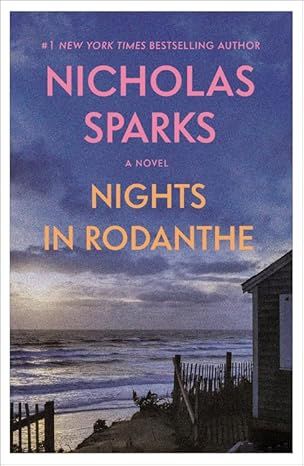
Nights in Rodanthe
4.6
-
3,717
$0.99
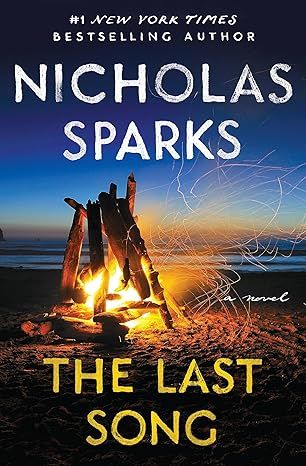
The Last Song
4.6
-
7,035
$0.99
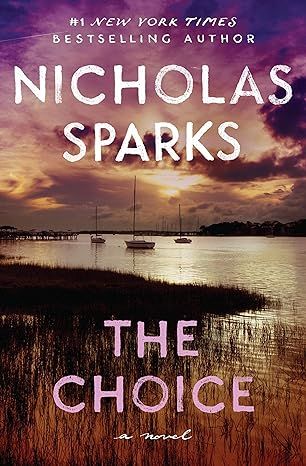
The Choice
4.4
-
22,262
$0.99
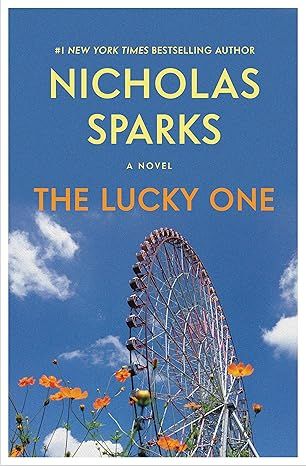
The Lucky One
4.6
-
8,044
$0.99
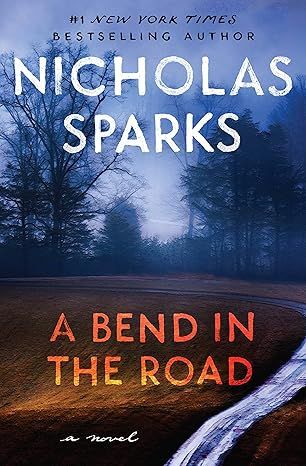
A Bend in the Road
4.6
-
9,069
$0.99
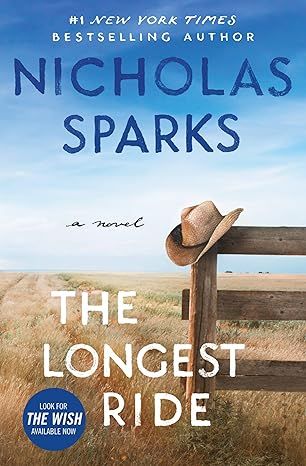
The Longest Ride
4.6
-
31,183
$0.99
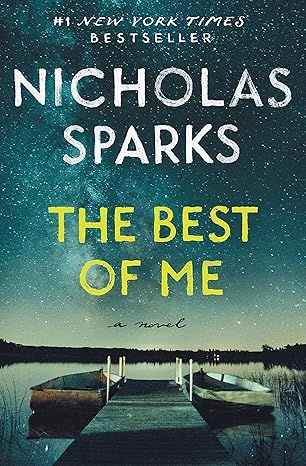
The Best of Me
4.5
-
18,103
$0.99
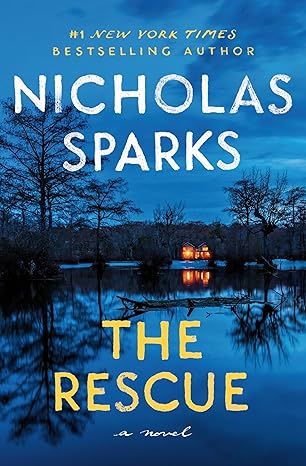
Rescue
4.5
-
25,514
$0.99
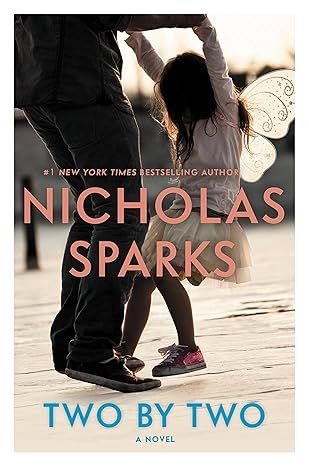
Two by Two
4.4
-
28,575
$0.99
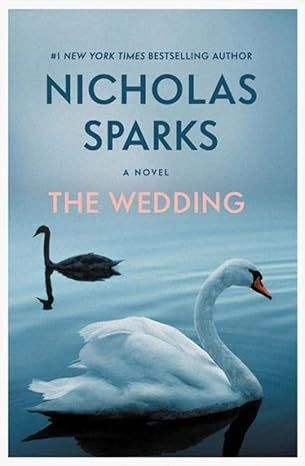
The Wedding
4.6
-
11,893
$0.99
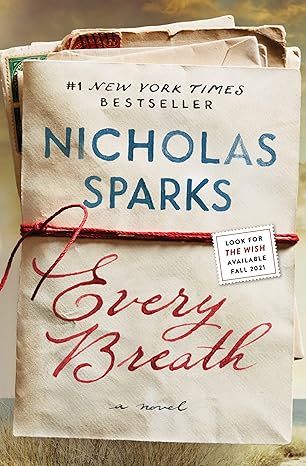
Every Breath
4.6
-
35,865
$0.99
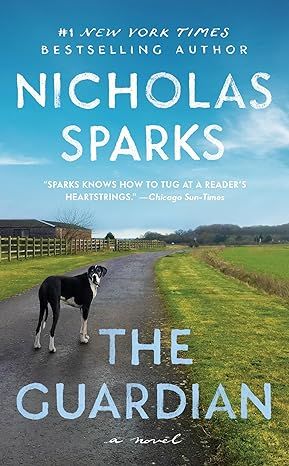
The Guardian
4.5
-
12,153
$0.99
Best Sellers
View all
The Tuscan Child
4.2
-
100,022
$8.39

The Thursday Murder Club: A Novel (A Thursday Murder Club Mystery)
4.3
-
155,575
$6.33

Sapiens: A Brief History of Humankind
4.6
-
140,302
$13.49

The Butterfly Garden (The Collector, 1)
4.3
-
88,556
$9.59

Things We Hide from the Light (Knockemout Series, 2)
4.4
-
94,890
$11.66

The Last Thing He Told Me: A Novel
4.3
-
154,085
$2.99

The Perfect Marriage: A Completely Gripping Psychological Suspense
4.3
-
143,196
$9.47

The Coworker
4.1
-
80,003
$13.48

First Lie Wins: A Novel (Random House Large Print)
4.3
-
54,062
$14.99

Mile High (Windy City Series Book 1)
4.4
-
59,745
$16.19

Layla
4.2
-
107,613
$8.99

The Locked Door
4.4
-
94,673
$8.53
